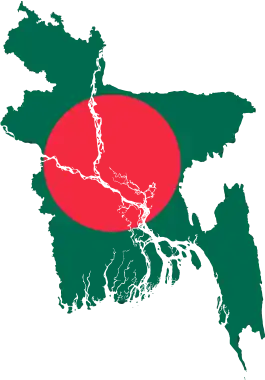1969 Mass uprising in East Pakistan
The 1969 uprising in East Pakistan (ঊনসত্তরের গণঅভ্যুত্থান) was a democratic political movement in East Pakistan (now Bangladesh). The uprising consisted of a series of mass demonstrations and sporadic conflicts between government armed forces and the demonstrators. Although the unrest began in 1966 with the Six point movement of Awami League, it got momentum at the beginning of 1969 and culminated in the resignation of Field Marshal Ayub Khan, the first military ruler of Pakistan. The uprising also led to the withdrawal of Agartala Conspiracy Case and acquittal of Sheikh Mujibur Rahman and his colleagues from the case.[1]
Part of a series on the |
|---|
| History of Bangladesh |
 |
|
|
Timeline of events in 1969
- 5 January: Shorbodolio Chatro Shongram Porishad (The All Party Student Action Committee) puts forth its 11-point agenda.
- 7–8 January: Formation of a political coalition named Democratic Action Committee (DAC) to restore democracy.
- 20 January: Student activist Asaduzzaman dies as the police opens fire on demonstrators.
- 24 January: Matiur, a teenager activist, is gunned down by the police.
- 15 February: Sergeant Zahurul Haq, one of the convicts of Agartala Conspiracy Case, is assassinated in the prison of Kurmitola Cantonment.
- 18 February: Dr. Shamsuzzoha of Rajshahi University is killed as the police open fire on a silent procession in Rajshahi.
- 22 February: Withdrawal of Agartala Conspiracy Case.
- 23 February: Sheikh Mujibur Rahman is accorded a grand reception, where he is given the title Bangabandhu (friend of Bengal).[1]
- 10–13 March: Ayub Khan calls for a round-table meeting with the opposition.
- 25 March: Ayub Khan hands over power to General Yahya Khan, the army Chief of Staff.
References
- Kamal, Mesbah; Kibria, Arifatul. "Mass Upsurge, 1969". Banglapedia. Retrieved 24 July 2015.
This article is issued from Wikipedia. The text is licensed under Creative Commons - Attribution - Sharealike. Additional terms may apply for the media files.